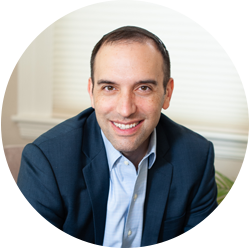Dear friends,
This week CJP hosted our first ever Global Jewish Citizenship Summit, which was attended by people from Greater Boston, Haifa, and Dnipro, Ukraine — our three partner cities — and from around the Jewish world.
In an ordinary year, members of our community travel to Israel for our Boston-Haifa Connection’s “March meetings,” during which we plan for the year ahead, see firsthand the impact of our investments, get work done together, and, most importantly, connect with one another on a human level. People-to-people relationships — caring for each other and deepening our knowledge and understanding about one another — are the foundations upon which we build vibrant, connected Jewish communities, and on which we sustain the thousands-years-old Jewish idea that “kol Yisrael arevim zeh l’zeh,” all of Israel are bound together and collectively responsible for one another.
This year, while we could not be together in person, we opened these meetings to our broader communities and created dynamic learning sessions to engage in public conversation about the challenges and opportunities that are going to define our shared future. Keynote sessions focused on responses to a global pandemic — especially Israel’s vaccination success; the relationship between Israel, North America, and Jews around the world; and the changing dynamics of the Middle East in light of the Abraham Accords.
The Summit reflected CJP’s commitment to convening the right people — partners, volunteers, donors, community members, political leaders, entrepreneurs, and visionaries from around the Jewish world — to have the right conversations about where we’ve been and where we’re going.
We often read and hear about the challenges we face as a Jewish People, including growing polarization and rifts between Israel and North American Jewry, as well as within our own communities. We know that too many North American Jews, especially in the younger generation, feel disconnected from concepts like Zionism and Peoplehood. These challenges are real, and we need to talk about them, but this divide is not insurmountable. In fact, the relationships we have built between Boston, Haifa, and Dnipro are a blueprint and tikkun (repair) from which the Jewish world can learn, as well as models for achdut (unity) and amiut (Peoplehood) in the 21st century. The future is in our hands and we have the power to shape it, together.
As we begin to prepare for Passover three weeks from now, I am reminded of the way Rabbi David Hartman (zt”l) described Judaism. Explaining what it means for each of us to internalize the Exodus story and the idea that “we were slaves in Egypt,” he writes: “Judaism is unique in that rather than beginning with a leap of faith, it demands a leap of identification with a people and its history.”
This “leap of identification” reminds me of Moses’ powerful words in this week’s Torah portion. Arguing with God, who wants to wipe out the Israelites after the sin of the golden calf, Moses pleads passionately on their behalf with his own life and leadership: “If you will not forgive them, erase me from your book!” No matter how close a personal relationship he has with God, Moses will not continue his journey without his People.
To me, both of these quotes beautifully illustrate the concept of global Jewish citizenship: a deep sense of interconnectedness with Jews around the world, and of the privilege and responsibility that come with being part of the Jewish People; taking responsibility both for our global Jewish family and, as Jews on the world stage, contributing to building a better world. None of us can go it alone. We walk through that world as parts of a greater whole, inheritors of an extraordinary story, and writers and creators of the next chapters.
Shabbat Shalom,
Rabbi Marc Baker

About the Author
CJP President and CEO Rabbi Marc Baker is an educator, writer, and leadership mentor who is devoting his life to Jewish learning and building Jewish communities.
